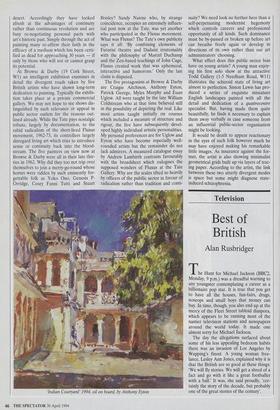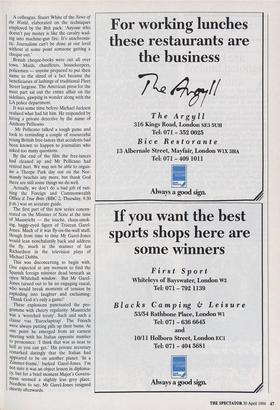Television
Best of British
Alan Rusbridger
The Hunt for Michael Jackson (BBC2, Monday, 9 p.m.) was a dreadful warning to any youngster contemplating a career as a billionaire pop star. It is true that you get to have all the houses, fun-fairs, drugs, noseops and small boys that money can buy. In time, though, you also end up at the mercy of the Fleet Street tabloid diaspora, which appears to be running most of the nastier television stations and newspapers around the world today. It made one almost sorry for Michael Jackson.
The day the allegations surfaced about some of his less appealing bedroom habits there was an invasion of Los Angeles by Wapping's finest. A young woman free- lance, Lesley Ann Jones, explained why it is that the British are so good at these things: 'We will fly stories. We will get a shred of a fact and go with it like a great footballer with a ball.' It was, she said proudly, 'cer- tainly the story of the decade, but probably one of the great stories of the century'. A colleague, Stuart White of the News of the World, elaborated on the techniques employed by the Brit pack: 'Anyone who doesn't pay money is like the cavalry wad- ing into machine-gun fire. It's anachronis- tic. Journalism can't be done at our level Without at some point someone getting a cheque out.'
British cheque-books were out all over town. Maids, chauffeurs, housekeepers, policemen — anyone prepared to put their name to the shred of a fact became the beneficiaries of lashings of traditional Fleet Street largesse. The American press for the most part sat out the entire affair on the sidelines, gawping in wonder along with the LA police department.
It was some time before Michael Jackson realised what had hit him. He responded by hiring a private detective by the name of Anthony Pellicano.
Mr Pellicano talked a tough game and took to reminding a couple of resourceful young British free-lances that accidents had been known to happen to journalists who asked too many questions.
By the end of the film the free-lances had cleaned up and Mr Pellicano had retired hurt. We may not be able to organ- ise a Thorpe Park day out on the Nor- mandy beaches any more, but thank God there are still some things we do well.
Actually, we don't do a bad job of run- ning the Foreign and Commonwealth Office if True Brits (BBC 2, Thursday, 9.30 p.m.) was an accurate guide.
The first part of this new series concen- trated on the Minister of State at the time of Maastricht — the louche, chain-smok- ing, baggy-eyed figure of Tristran Garet- Jones. Much of it was fly-on-the-wall stuff, though from time to time Mr Garel-Jones would lean nonchalantly back and address the fly, much in the manner of Ian Richardson in the television plays of Michael Dobbs.
This was disconcerting to begin with. One expected at any moment to find the Spanish foreign minister dead beneath an Open Whitehall window. But Mr Garel- Jones turned out to be an engaging rascal, who would break moments of tension by exploding into laughter and exclaiming: 'Thank God it's only a game!'
These explosions punctuated the pro- gramme with cheery regularity. Maastricht was a 'wretched treaty'. Such and such a clause was Turoclaptrap'. The French were always putting pills up their bums. At One point he emerged from an earnest meeting with his Italian opposite number to pronounce: 'I think that was as near to hell as you can get.' His private secretary remarked daringly that the Italian had appeared to be on another planet. 'In a Zimmer-frame,' barked Garel-Jones. I'm not sure it was an object lesson in diploma- cy, but for a brief moment Major's Govern- ment seemed a slightly less grey place. Needless to say, Mr Garel-Jones resigned Shortly afterwards.



























































 Previous page
Previous page